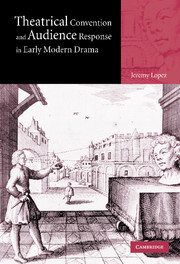Book contents
- Frontmatter
- Contents
- Acknowledgments
- Introduction
- PART I
- PART II
- Introduction to Part II
- 6 Drama of disappointment: character and narrative in Elizabethan and Jacobean tragedy
- 7 Laughter and narrative in Elizabethan and Jacobean comedy
- 8 Epilogue: Jonson and Shakespeare
- Plays and editions cited
- Works cited
- Index
8 - Epilogue: Jonson and Shakespeare
Published online by Cambridge University Press: 22 September 2009
- Frontmatter
- Contents
- Acknowledgments
- Introduction
- PART I
- PART II
- Introduction to Part II
- 6 Drama of disappointment: character and narrative in Elizabethan and Jacobean tragedy
- 7 Laughter and narrative in Elizabethan and Jacobean comedy
- 8 Epilogue: Jonson and Shakespeare
- Plays and editions cited
- Works cited
- Index
Summary
Whether or not Jonson and Shakespeare deserve a chapter of their own is, I hope, a question this book has at least raised. I do not want by any means at this point to put Shakespeare and Jonson above the rest of their contemporaries, but it is true that thinking about these two playwrights has governed and does govern most of our thought about the drama of the English Renaissance. It is in the interest of explicitly putting some of that thinking within the context of this study, and thereby making some gestures toward new directions in Shakespeare and Jonson criticism, that I undertake the following discussion.
Insofar as Ben Jonson's comedies are, as Alan Dessen argues, “moral comedies,” in which Jonson “has … involved his audience in the moral and ethical issues of the play in such a way that their laughter now turns back upon themselves”; and insofar as they are “acts of theatrical imperialism,” in which Jonson “systematically subsumes the more conventional plays of his competitors, forcing them to work for his exaltation,” they are perhaps the clearest example – because they are so deliberate – of how Renaissance comedy in general, like its individual plots, works by a process of exclusion. Jonson's comedies are highly self-contained, and the audience is taught to laugh to scorn anything that exists outside of them.
- Type
- Chapter
- Information
- Publisher: Cambridge University PressPrint publication year: 2002



